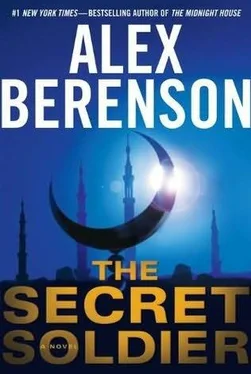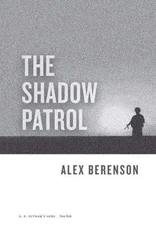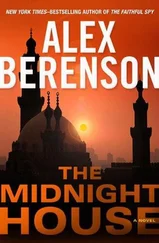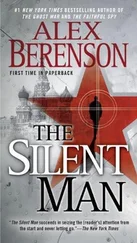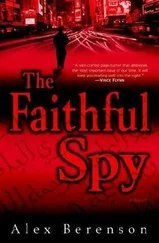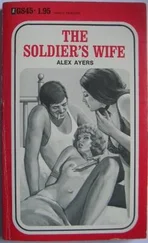Alex Berenson - The Secret Soldier
Здесь есть возможность читать онлайн «Alex Berenson - The Secret Soldier» весь текст электронной книги совершенно бесплатно (целиком полную версию без сокращений). В некоторых случаях можно слушать аудио, скачать через торрент в формате fb2 и присутствует краткое содержание. Жанр: Шпионский детектив, на английском языке. Описание произведения, (предисловие) а так же отзывы посетителей доступны на портале библиотеки ЛибКат.
- Название:The Secret Soldier
- Автор:
- Жанр:
- Год:неизвестен
- ISBN:нет данных
- Рейтинг книги:4 / 5. Голосов: 1
-
Избранное:Добавить в избранное
- Отзывы:
-
Ваша оценка:
- 80
- 1
- 2
- 3
- 4
- 5
The Secret Soldier: краткое содержание, описание и аннотация
Предлагаем к чтению аннотацию, описание, краткое содержание или предисловие (зависит от того, что написал сам автор книги «The Secret Soldier»). Если вы не нашли необходимую информацию о книге — напишите в комментариях, мы постараемся отыскать её.
The Secret Soldier — читать онлайн бесплатно полную книгу (весь текст) целиком
Ниже представлен текст книги, разбитый по страницам. Система сохранения места последней прочитанной страницы, позволяет с удобством читать онлайн бесплатно книгу «The Secret Soldier», без необходимости каждый раз заново искать на чём Вы остановились. Поставьте закладку, и сможете в любой момент перейти на страницу, на которой закончили чтение.
Интервал:
Закладка:
“If they ask where we’re going?”
“Tell them you can’t say.”
At the gatehouse, the guard was a small dark-skinned man who wore a blue shirt with a seven-pointed star. “Yes?”
Gaffan flashed his badge.
“Let me see that,” the guard said. Gaffan handed his badge and ID over. Wells followed.
“This is Jamaica. Not America.”
“The man we want, he’s a U.S. citizen.”
“What’s his name?”
“I can’t tell you.”
“No name, no pass.”
“Call our embassy.”
“Tell me his name or I call the constables myself—”
Wells leaned across the seat. “His name’s Mark Edward. Drives a Toyota with a big spoiler on the back. Celica.”
The guard nodded. “That one a cheap bastard. Gwaan, then. You know where to find him?”
“End of the second row on the left.”
“Exactly wrong. Right and then left. House one-forty-three.”
The barrier rose, and they rolled ahead. “His son’s first name and his middle name,” Gaffan said. “Nice guess.”
“Looks like he should have tipped the guards better at Christmas.”
THE HOUSES AT UNITY Hall were a mix of brick mansions on narrow lots and semi-attached town houses. Robinson’s was one of the latter. His Celica sat in the driveway in front, black, a spoiler jutting off the back deck. A pink flamingo and three dwarfs in Rasta hats graced the concrete front landing. Gaffan drove past, dropped Wells in front of the house. He walked ahead and rang the doorbell. A chime inside boomed.
“Who is it?”
Wells rang again, heard a man stepping slowly down the stairs in the front hall. He unholstered his pistol, held it low by his side.
“Yes? Who’s there?” The voice was raspy and low. He’d heard it a few days before, on the phone in Janice’s house in Vienna. But not in person. Until now, Wells and Keith Robinson had never met.
“Keith.”
“You have the wrong address.”
“Keith. It’s John Wells. It’s over.”
CHAPTER 4
THE AMERICAN EMBASSY COMPOUND IN SAUDI ARABIA WAS A FOR tress within a fortress, the most heavily guarded building in Riyadh’s high-walled Diplomatic Quarter. The Saudi government had built the zone in the 1980s, on a low mesa on the western edge of Riyadh. Unsmiling Saudi soldiers in armored personnel carriers guarded its gates, subjecting vehicles to inspection by explosives-sniffing dogs. Trucks and SUVs faced undercarriage examinations with long-handled mirrors, the bomb-squad version of the reflectors that dentists used to see inside their patients’ mouths. Drivers who grumbled about the searches found themselves forced to turn off their engines — and their air-conditioning. With summer afternoons in Riyadh topping one hundred twenty degrees, complaints were rare.
Behind the walls, the quarter stretched three square miles. It should have been a pleasant place, especially compared to the rest of Riyadh. The Saudi government had spent a billion dollars on the district, hoping it would attract executives at multinational companies, and even wealthy Saudis. The quarter was subject to the same strict Islamic laws as the rest of the Kingdom, but it had coffee shops, parks, even a riding club. Date palms lined its boulevards. Its central square had won an award for fusing traditional Islamic architecture with modern design. In 1988, a local magazine had bragged that with its picnics and bicycling children, the zone could be mistaken for Geneva or Washington.
No more. The hassles at the checkpoints had driven Saudis out of the zone, but they hadn’t reassured Americans and Europeans. Following attacks on other Western compounds, multinational companies had shrunk their staffs in the Kingdom to a minimum. The quarter felt besieged, its avenues empty, gardens run-down. It had turned into Paris in 1940, with the Wehrmacht approaching. Anyone with a choice had left. The remaining expats huddled in houses with thick steel doors and barred windows, in case a band of suicide attackers penetrated the checkpoints.
The American embassy was the ultimate target, of course. The embassy occupied six acres near the quarter’s western edge, on the oddly named Collector Road M — though its location was no longer disclosed on the State Department’s website, as though that omission might stop terrorists from finding it. It had opened in 1986, at a ceremony presided over by then Vice President George Herbert Walker Bush.
At the time, Osama bin Laden was just another young Saudi heading to Afghanistan to fight jihad. Still, the attacks on American embassies in Pakistan and Iran in 1979 had made the State Department aware of the Islamic terror threat. The new embassy in Riyadh had been built to withstand a sustained attack. Its concrete exterior walls were a foot thick. The embassy itself was a modern castle, built around a courtyard, with few exterior windows.
Security had been tightened further since September 11. Today, visitors parked outside the compound and then passed through explosive detectors at a marine-staffed checkpoint. Besides M-4 carbines, the marine guards toted shotguns, their fat barrels projecting immediate menace. Without exception, the guards had seen combat in Iraq and Afghanistan. They were ready for war.
AMBASSADOR GRAHAM KURLAND HOPED they’d never have to use their skills.
Kurland and his wife, Barbara, lived inside the embassy compound in a mansion formally called Quincy House. The name referred to the USS Quincy, the cruiser where Franklin Delano Roosevelt had met Abdul-Aziz, the first Saudi king, in February 1945.
The king had never seen a wheelchair until he met Roosevelt, who used one because of his polio-damaged legs. Abdul-Aziz, who was severely overweight, found the contraption fascinating. Roosevelt gave the king his spare chair, cementing the partnership between the United States and Saudi Arabia. That was the legend, anyway.
In fact, chair or no chair, the two countries had good reason to ally as World War II ended. By 1945, vast oil deposits had been found under the sands of the Kingdom’s Eastern Province. Having seen oil’s strategic importance during the war, neither Roosevelt nor the king wanted the oil to fall into Soviet paws. And the Saudis were predisposed to trust the United States, which had avoided the Middle East empire-building of France and Britain.
To commemorate the fateful meeting, a model of the Quincy sat in the lobby of the ambassador’s residence. And the United States and Saudi Arabia had stuck to their bargain. Even after the formation of the Organization of the Petroleum Exporting Countries, the Saudis tried to keep oil cheap. In return, the United States made sure that Iran and Iraq never seriously threatened the Kingdom.
But recently the partnership had frayed. Blaming bin Laden for the problems was the easy answer, Ambassador Kurland thought. But bin Laden spoke for millions of Saudis who felt they were living under a dictatorship disguised as a monarchy.
Now the terrorists had struck again. The dead in the Khozama bombing included an American, David Landie, a reporter for the Chicago Tribune. The day before the bombing, Landie had interviewed Kurland at Quincy House. The embassy’s public-relations officer had warned Kurland to stick to his talking points. Even so, Kurland was happy to talk to an American journalist. Few visited Riyadh anymore, aside from a couple stalwarts from The New York Times.
Landie was researching an article about the success, or lack thereof, of the camps where the Saudis “re-educated” former Guantánamo detainees. The camps had gained a reputation as a joke, since so many ex-Gitmo prisoners had returned to terrorism. Now, instead of waiting to see whether Landie quoted him accurately, Kurland had the grim task of helping repatriate what was left of his body. Kurland wondered if the Khozama bombers included any ex-prisoners. He suspected that Landie’s family would not appreciate the irony.
Читать дальшеИнтервал:
Закладка:
Похожие книги на «The Secret Soldier»
Представляем Вашему вниманию похожие книги на «The Secret Soldier» списком для выбора. Мы отобрали схожую по названию и смыслу литературу в надежде предоставить читателям больше вариантов отыскать новые, интересные, ещё непрочитанные произведения.
Обсуждение, отзывы о книге «The Secret Soldier» и просто собственные мнения читателей. Оставьте ваши комментарии, напишите, что Вы думаете о произведении, его смысле или главных героях. Укажите что конкретно понравилось, а что нет, и почему Вы так считаете.
